The Renaissance of Rehabilitation through Digital Skills
In the dynamic tapestry of rehabilitation, a revolutionary force is quietly reshaping the destinies of those confined within prison walls: the transformative power of digital skills.
In an era where technological prowess defines success, forward-thinking programs are stepping up to empower inmates with the tools needed for a seamless reintegration into society.
In this extensive exploration, we will delve into the profound impact of digital skills on inmate rehabilitation, unraveling the multifaceted benefits that extend beyond mere employability, ultimately fostering personal growth and societal harmony.
Understanding the Challenge:
Rehabilitating individuals within the confines of a correctional facility is a multifaceted challenge. Traditional approaches often struggle to equip inmates with the skills necessary to thrive in a world that is rapidly advancing, technologically speaking. As we hurtle into a future where digital literacy is increasingly non-negotiable, the gap between those with and without these skills becomes a critical factor in determining an individual’s post-release trajectory.
The Power of Digital Skills:
Digital skills, a broad spectrum ranging from basic computer literacy to advanced programming capabilities, are more than just a curriculum; they represent a paradigm shift in the approach to inmate rehabilitation.
Let’s embark on a journey through the layers of this transformative force, understanding how it not only imparts practical proficiency but acts as a catalyst for personal growth, enhanced employability, and a reduced likelihood of recidivism.
Empowering Inmates Through Education: The confined nature of correctional facilities often limits educational opportunities. Introducing comprehensive digital skills education programs not only imparts practical knowledge but also instills a sense of accomplishment. Inmates gain confidence in engaging with the modern world, armed with skills that extend far beyond the prison walls. Digital literacy becomes a tool for empowerment, breaking down the barriers of limited educational access.
Building Marketable Skills: Post-release employment is a critical challenge for former inmates. Digital skills, ranging from graphic design to programming and digital marketing, provide a tangible pathway to meaningful employment. In a world where industries are digitizing at an unprecedented pace, individuals armed with these skills become valuable assets, thereby breaking the cycle of unemployment and increasing the chances of successful reintegration into society.
Fostering Entrepreneurship and Innovation: Beyond employment, digital literacy opens doors to entrepreneurial opportunities. Inmates, often possessing untapped creative potential, can channel their ideas into digital ventures. Whether it’s developing applications, creating online content, or offering digital services, the world of technology becomes a platform for innovation and self-sufficiency. Digital skills empower individuals to shape their destinies beyond the confines of traditional employment.
Enhancing Cognitive and Problem-Solving Abilities: Learning digital skills requires a depth of critical thinking and problem-solving. Inmates engaged in coding or software development develop logical reasoning and attention to detail—cognitive abilities that extend beyond the digital realm. These skills contribute to personal development, fostering resilience and positively impacting interactions within and outside the prison environment.
Connecting Inmates with the Outside World: Digital skills facilitate communication and connection. Inmates with access to technology can maintain meaningful contact with family members, access educational resources, and stay informed about the world outside. This connectivity helps bridge the gap between incarceration and the outside world, easing the transition when the time for release arrives The Role of Digital Skills in Rehabilitation.
Implementation Challenges and Solutions:
The integration of digital skills into inmate rehabilitation is not without its challenges. Limited resources, security concerns, and a lack of awareness regarding the transformative impact of digital literacy must be addressed to ensure the success and sustainability of these programs.
Securing Resources: Funding and resources are integral to the success of digital skills programs within correctional facilities. Advocacy efforts, partnerships with tech companies, and collaboration with educational institutions can help secure the necessary resources, ensuring the sustainability and scalability of these initiatives.
Addressing Security Concerns: The introduction of technology into prison environments raises legitimate security concerns. However, with careful planning, secure networks, and supervised access, the risks can be minimized. Training staff on the responsible use of technology and implementing robust cybersecurity measures are essential components of a successful digital skills program.
Raising Awareness: The transformative potential of The Role of Digital Skills in Rehabilitation is a story that needs to be shared. Raising awareness among policymakers, prison staff, and the public is essential to garner support for these programs. Success stories and case studies can be powerful tools in changing perceptions and building a strong case for the integration of digital skills education.

Conclusion: A Visionary Approach to Rehabilitation
As we navigate the ever-changing landscape of rehabilitation, digital skills emerge as a visionary force that transcends the limitations of traditional methods. By equipping inmates with the tools to navigate the digital landscape, we not only empower individuals but also contribute to the creation of a more technologically literate and inclusive society.
Through education, skill-building, and the power of connectivity, we can break the chains of recidivism and pave the way for a brighter,The Role of Digital Skills in Rehabilitation digitally empowered future for those seeking a second chance.
In the grand tapestry of rehabilitation, let digital skills be the thread that weaves stories of transformation, resilience, and redemption—stories that echo far beyond prison walls, resonating in the collective narrative of a society that believes in the power of second chances and the limitless potential for change.


